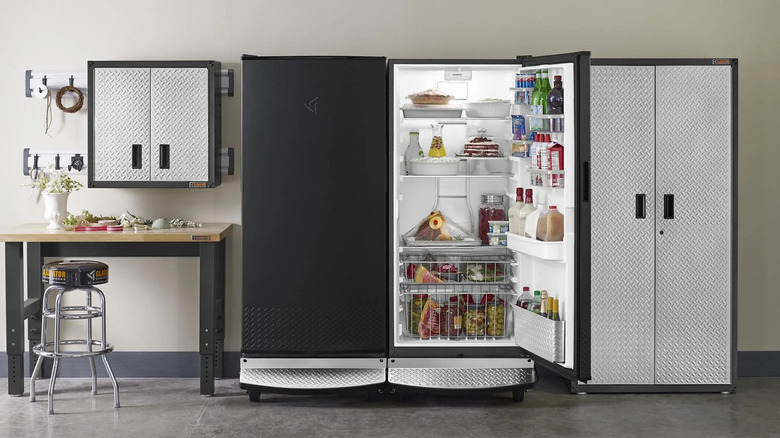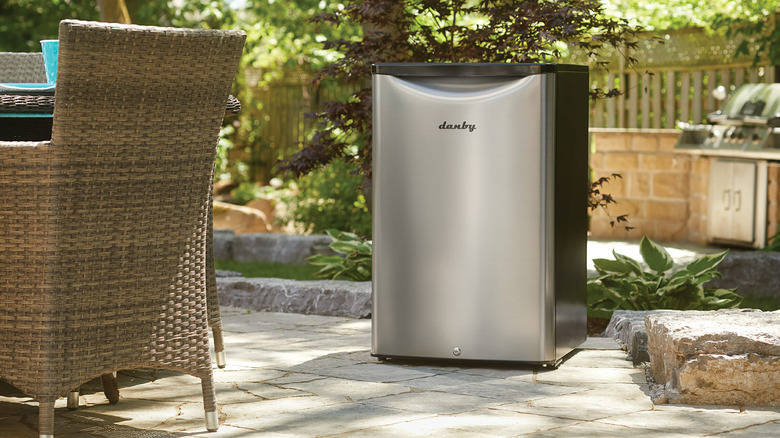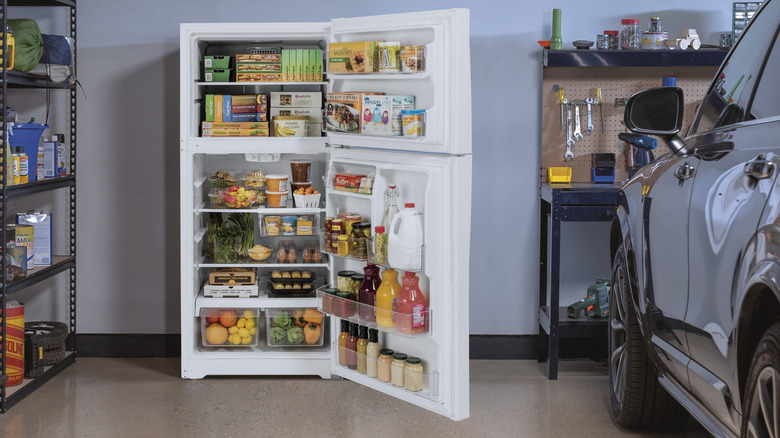What To Consider Before Getting A Garage Fridge
We may receive a commission on purchases made from links.
It's so intuitive you can't believe it didn't occur to you before: For the hundredth time this summer, you've tromped into the kitchen covered in grass clippings or motor oil to grab a much-needed drink from the fridge. Now the kitchen floor, refrigerator, cabinet handles, and everything else you came close to is also covered in grass and oil. Then it hit you — move the fridge to the garage, problem solved. Or better yet, a garage fridge! A place to keep cold beverages and snacks at hand, and a way to cool down your mower's hot oil plug so you can put it back in without burning yourself. Genius, right? Well, it depends on the fridge itself. Some refrigerators are happier in the untamed wilds of a garage than others.
There are a few reasons why just any old fridge you pick up at a yard sale might not be suited for garage duty. Some are matters of fact, some are matters of practicality, and some are matters of preference and priority. This last category involves a lot of questions only your family can address: Will the additional expense of running a garage fridge be justifiable? Will it serve any other purpose, like handling overflow from the kitchen fridge? Do you even have room for it?
Will the fridge work in hot and cold weather?
The most pressing challenge for any garage refrigerator is doing its job in the oven-like heat garages collect in the summer. Ideally, they would also be designed to handle the winter lows where you live as well. But wait, you cry, how is cold such a problem for something I bought to make things cold? If a refrigerator's sole thermostat monitors the refrigerator compartment, freezing weather could convince the compressor to remain off. This effectively turns its freezer into an insulated, uncooled compartment. If your garage experiences sub-freezing temps often, you can consider one of the few refrigerator/freezer combinations rated to handle low ambient temperatures, or purchase a garage refrigerator kit, like this one from Frigidaire ($26.81 at Home Depot). These kits trick your refrigerator into thinking it's warmer than it really is, so it still functions properly even when garage temperatures are very low.
Usually, though, fridges struggle most to keep up with sweltering summer garage temperatures. Newer "garage-ready" refrigerators made for this purpose, including some outdoor refrigerators, are normally rated to work in temperatures ranging from their operating temperature of around 38 degrees Fahrenheit to 110 degrees Fahrenheit. This, of course, means that a non-garage-ready fridge, only designed to work intermittently at room temperature (say, 80 degrees Fahrenheit and below), will struggle to keep up and will wear out very quickly. Therefore, in certain situations, there can even be energy-saving benefits to installing an air conditioner in your garage.
A few more powerful considerations
A bunch of other factors contribute to whether a fridge will work in your garage, so it's worth a good think to figure out where you stand on these. Refrigerators are often the reason your electric bill is through the roof, and this is especially true if it runs more than a normal refrigerator. For example, newer models are usually more energy-efficient than older ones, so consider avoiding the temptation to stick an old, unused fridge in your garage. And while they might be a little more energy-efficient, cold-wall refrigerators can't recover from being opened as quickly as forced-air models; if you plan to run through a lot of beverages or snacking, forced air might be better for you. Plus, refrigerators in better condition are more efficient than those in need of a new door seal or a good cleaning.
If you're determined to give your garage fridge all that power, remember that some refrigerators require 2,000 watts of power when the compressor kicks on, so it would be wise to run your garage fridge on a dedicated 20-amp circuit. Otherwise, it might trip its circuit breaker and stop cooling altogether. If your circuit breaker box is in your garage, it can be fairly easy to add a dedicated circuit. But is it worth it? Only you can say. All we can tell you is that you're not going to get that lawn mowed while you're in the kitchen sweeping up grass clippings.


